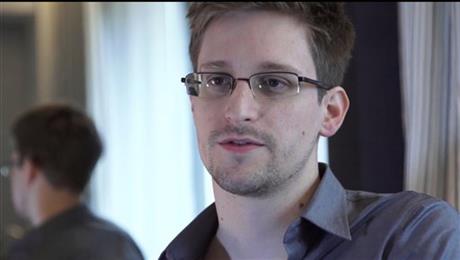
By FREDERIC J. FROMMER
This photo provided by The Guardian Newspaper in London shows Edward Snowden, who worked as a contract employee at the National Security Agency, on Sunday, June 9, 2013, in Hong Kong. The National Security Agency, working with the British government, has secretly been unraveling encryption technology that billions of Internet users rely upon to keep their electronic messages and confidential data safe from prying eyes, according to published reports Thursday, Sept. 5, 2013, based on internal U.S. government documents.(AP Photo/The Guardian, Glenn Greenwald and Laura Poitras)
WASHINGTON (AP) — The Justice Department is declassifying portions of some secret court orders concerning the government’s authority to seize records under the Patriot Act.
The department revealed its decision to declassify the Foreign Intelligence Surveillance Court opinions in a filing with the federal court in the Northern District of California Wednesday. The government says it will provide hundreds of pages of documents to the Electronic Frontier Foundation, an Internet civil liberties group that had filed a lawsuit under the Freedom of Information Act.
The release of the records is in response to an order issued by a federal judge in California. In its filing, the Justice Department said it was “broadly construing” that order and is declassifying a larger set of documents than the ruling required.
The Justice Department said it would provide the document to the foundation by Tuesday.
The Electronic Frontier Foundation is seeking documents about the government’s interpretation and use of Section 215 of the Patriot Act, which allows the government to seize a wide range of documents. That section requires the government to show that there are “reasonable grounds to believe” that the records are relevant to an investigation intended to “protect against international terrorism or clandestine intelligence activities.”
David Sobel, the foundation’s senior counsel, said it was “unfortunate” that it took his group’s lawsuit to make the material public.
“Significant decisions of the FISA Court should be largely unclassified,” he said. “The release of this material is overdue.”
Sobel’s colleague at the foundation, Jennifer Lynch, said she is expecting to receive the documents on Tuesday and expects to find among them further explanation of the government’s rationale for setting up and carrying out the program.
Justice Department spokesman Andrew Ames said in an email that the government determined that some portions of the records in the lawsuit are no longer classified, given recent declassification decisions by the director of national intelligence.
The Obama administration’s decision in the case comes just two weeks after it declassified three secret FISA opinions — including one in response to a separate Electronic Frontier Foundation lawsuit in the federal court in Washington. In that October 2011 FISA opinion, Judge James D. Bates rebuked government lawyers for repeatedly misrepresenting the operations of the National Security Agency’s surveillance programs. He said the government’s “upstream” collection of data — taken from internal U.S. data sources — was unconstitutional. Portions of that order remain blacked out.
On Wednesday, while it said it would declassify documents in the California case, the Justice Department asked a judge in the Washington case to rule that it can continue to black out those materials in the October 2011 FISA opinion. Among other reasons given, the government says that disclosure could damage national security.
Interest in the government’s spying programs has spiked in the wake of leaks by analyst-turned-fugitive Edward Snowden, who revealed that the NSA’s spying went further and gathered millions more communications than most Americans realized. Lynch said she believes Snowden’s disclosures likely contributed to the government’s decision to declassify and release documents related to its surveillance program. “I think the public outcry forced their hand,” she said.
__
Associated Press writer Paul Elias in San Francisco contributed to this report.



